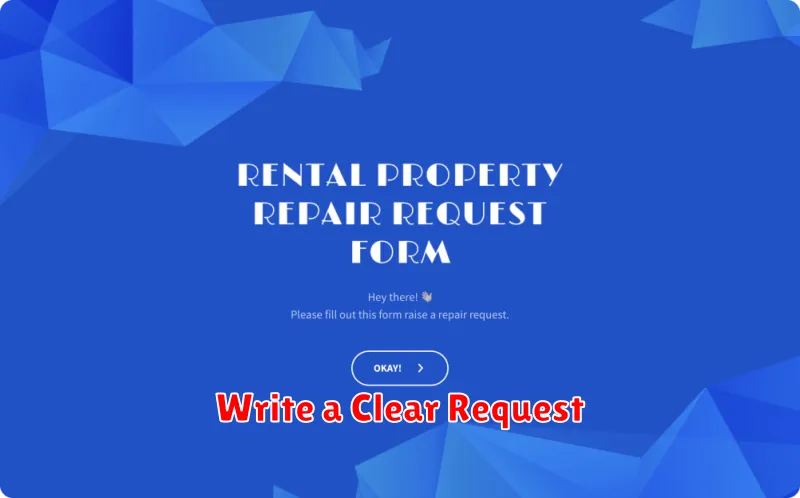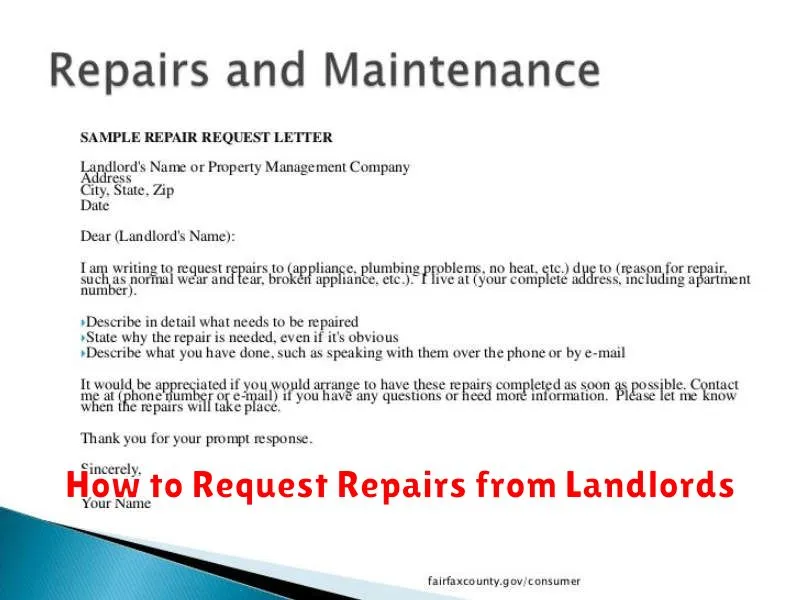Are you dealing with a leaky faucet, broken appliance, or other maintenance issues in your rental property? Knowing how to request repairs effectively from your landlord is crucial for maintaining a safe and habitable living environment. This guide will provide you with a step-by-step process on how to properly request repairs, ensuring your concerns are addressed promptly and efficiently. We’ll cover everything from documenting the issue to understanding your tenant rights and navigating potential disputes with your landlord.
Requesting repairs from your landlord shouldn’t be a daunting task. This article outlines the best practices for communicating with your landlord, including what information to include in your repair request, how to follow up effectively, and what legal recourse you have if your landlord fails to address necessary repairs. Understanding your tenant rights and responsibilities regarding maintenance is essential for a positive renting experience. Learn how to navigate landlord-tenant relationships and ensure your living space is maintained to the required standards.
Know What Landlord Covers
Before requesting repairs, it’s crucial to understand your landlord’s responsibilities. Landlords are generally required to maintain a habitable dwelling. This includes addressing issues that affect your health and safety.
Typical landlord responsibilities include:
- Plumbing: Leaks, clogs, and hot water issues.
- Heating and Cooling: Maintaining a functional HVAC system.
- Electrical Systems: Addressing faulty wiring or outlets.
- Structural Integrity: Repairing roof leaks, cracks in walls, or other structural damage.
- Pest Control: In some jurisdictions, landlords are responsible for pest extermination.
Review your lease agreement, as it may outline specific responsibilities. Local housing codes also dictate landlord obligations. Understanding these parameters helps ensure your requests are valid and likely to be addressed promptly.
Write a Clear Request

A clear and concise repair request helps your landlord understand the issue and address it promptly. Be specific when describing the problem. Instead of saying “the sink is broken,” explain, “The kitchen sink faucet is dripping constantly, even when turned off.”
Include details such as:
- The exact location of the problem (e.g., “master bathroom,” “bedroom closet”).
- When the problem started (if known).
- Any relevant details that might help diagnose the issue (e.g., “a strange smell accompanies the leak,” “the noise occurs only at night”).
Document the issue. Take photos or videos, if possible. This provides visual evidence of the damage and its extent.
State your desired outcome. Do you want the item repaired or replaced? Being upfront about your expectations can help avoid misunderstandings.
Include Dates and Photos

When requesting repairs, providing specific dates and visual evidence significantly strengthens your case. This allows your landlord to understand the timeline of the issue and its severity.
Dates: Document when you first noticed the problem, any subsequent occurrences, and when you contacted your landlord about it. A clear timeline helps demonstrate the urgency and duration of the issue.
Photos: Clear photographs provide undeniable proof of the damage or needed repair. Take multiple photos from different angles to thoroughly document the issue.
Organize this information clearly and concisely in your written request. This meticulous documentation will help ensure your request is addressed promptly and effectively.
Follow Up Professionally
If you haven’t received a response within a reasonable timeframe (e.g., a few days to a week), follow up politely. A written follow-up is generally recommended, as it creates a documented record of your communication. Reiterate your original request and the date it was submitted.
Remain courteous and professional in your tone, even if you’re frustrated. Avoid accusatory or demanding language. Explain the ongoing impact of the unrepaired issue. For instance, you could state that the leaking faucet is wasting water and increasing your utility bill, or that the broken heating is creating an uncomfortable living environment.
If you’ve made multiple attempts to contact your landlord without success, consult your lease agreement for specified procedures regarding repairs. It might outline specific communication methods or escalation steps. Understanding your rights and responsibilities as a tenant is crucial.
Escalate When Ignored
If your landlord fails to respond to your initial repair request within a reasonable timeframe, it’s time to escalate the issue. A reasonable timeframe is typically considered anywhere from a few days to a week, depending on the severity of the issue.
First, send a follow-up written notice. Reiterate the original problem and note the lack of response. Keep a copy of this communication for your records.
If you still receive no response, review your lease agreement for the proper escalation procedure. This might involve contacting a property manager or a designated representative.
Depending on your local laws, you may have additional legal options, such as contacting your local housing authority or pursuing mediation. Research your local tenant rights and legal aid resources to understand your available courses of action.
Document all communication attempts, including dates, times, and methods of contact. This documentation will be crucial if further action is needed.
Legal Support Options
If your landlord fails to address necessary repairs after reasonable attempts at communication, you may need to explore legal avenues. Documenting all communication, including dates, times, and methods of contact, is crucial throughout this process.
Depending on your jurisdiction, several options may be available. These can include contacting a tenant rights organization for guidance and support. These organizations can provide valuable information about local laws and regulations.
Another option is seeking advice from a legal aid clinic or private attorney specializing in landlord-tenant disputes. They can advise you on the legal steps you can take, which may include formal demand letters, mediation, or filing a lawsuit in small claims court.
In some jurisdictions, you may have the right to withhold rent or repair and deduct the expenses from your rent. However, these options are often strictly regulated and should only be pursued after careful consideration and legal counsel, as improper use can have negative legal consequences.

